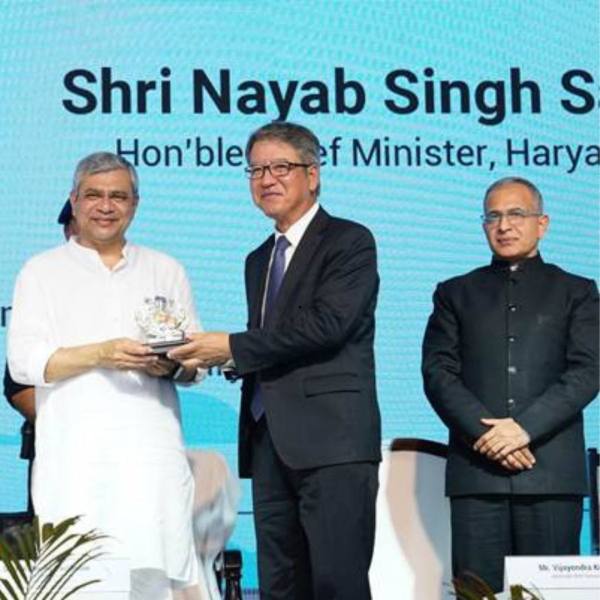

In a historic development for India’s logistics and transportation infrastructure, Union Minister for Railways, Information & Broadcasting, and Electronics & Information Technology, Shri Ashwini Vaishnaw, today inaugurated the country’s largest automobile-focused Gati Shakti Multi-Modal Cargo Terminal at Maruti Suzuki India Limited’s manufacturing facility in Manesar, Haryana.
The newly inaugurated Gati Shakti Cargo Terminal is poised to transform automobile logistics across India. Situated within Maruti Suzuki’s Manesar facility, it connects directly to Patli railway station through a 10-kilometre dedicated rail link. This crucial link forms part of the 121.7 km Haryana Orbital Rail Corridor, spearheaded by the Haryana Rail Infrastructure Development Corporation (HRIDC).
With a combined investment of ₹800 crore — ₹684 crore from HRIDC and the remaining by Maruti Suzuki — this advanced terminal boasts a massive loading capacity of 4.5 lakh vehicles annually, making it one of the highest capacity automobile terminals in the nation.
While addressing the gathering, Shri Ashwini Vaishnaw underscored the remarkable progress made by Indian Railways since 2014. He pointed out that the annual railway budget, which once stood at ₹24,000–25,000 crore, has now risen dramatically to ₹2.5 lakh crore.
He also highlighted the significant improvement in basic passenger amenities, noting that before 2014, many stations and coaches lacked even toilets. In the last two and a half years, Indian Railways has made focused efforts to enhance general-class travel, adding over 1,200 general coaches in just the past year.
In a major upgrade to suburban and short-distance commuting, the Minister announced the augmentation of over 100 MEMU (Mainline Electric Multiple Unit) trains from 8-coach to 16–20 coach configurations. A new factory at Kazipet in Andhra Pradesh has been established to support this expansion.
Encouraged by the success of the Namo Bharat trains, which have received an overwhelming public response, the Minister confirmed that production of 50 more such trains has been greenlit to meet growing passenger demand.
Emphasizing Indian Railways’ robust performance in 2023–24, Shri Vaishnaw stated that around 720 crore passengers and 1,617 million tonnes of freight were transported during the fiscal year. This has positioned India as the second-largest freight transporter globally, making the year a landmark one for the Railways.
In a major move to curb misuse and enhance transparency in the Tatkal ticketing system, a new rule effective from July 1, 2025, will mandate Aadhaar authentication and KYC verification for passengers booking tickets in the first 30 minutes of the Tatkal window.
Additionally, a pilot project is being tested in Bikaner Division, where reservation charts are being prepared 24 hours in advance rather than the traditional 4 hours. This shift has been warmly received by both passengers and local leaders.
Shri Vaishnaw also spotlighted the public’s positive reception of the newly launched Amrit Bharat Trains. Three trains are already operational, with six more to follow soon. Production of an additional 50 trains is underway, aiming to elevate the passenger experience nationwide.
Touching on Haryana’s progress, the Minister revealed that the state’s railway budget has grown over tenfold, from ₹300 crore in 2014 to ₹3,416 crore in 2024. In the past 11 years, Haryana has added 823 km of new railway lines, and its entire rail network has been fully electrified.
At present, Haryana is witnessing infrastructure projects worth ₹11,800 crore, including the redevelopment of 34 stations under the Amrit Bharat Station Scheme and the construction of 540 road overbridges and underpasses.
The inauguration ceremony was graced by several distinguished guests, including Haryana Chief Minister Shri Nayab Singh Saini, Industries Minister Shri Rao Narbir Singh, MLA Shri Mukesh Sharma, and Maruti Suzuki India Limited’s CEO & Managing Director, Mr. Hisashi Takeuchi.
The inauguration of the Gati Shakti Cargo Terminal marks a new era in India’s logistics and transportation landscape — aligning with the national vision of multimodal infrastructure integration and boosting ‘Make in India’ capabilities.